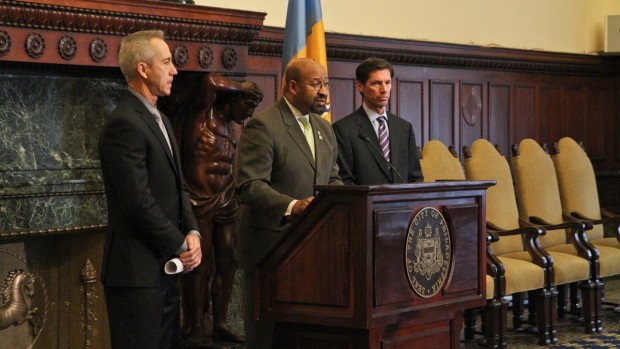Phila. mayor says $1.8B deal to sell city gas works offers Marcellus benefits
-
Katie Colaneri

Kimberly Paynter/WHYY
Philadelphia Mayor Michael Nutter announces Monday at City Hall that UIL Holdings Corp. of New Haven, Conn., plans to purchase Philadelphia Gas Works.
Today, Philadelphians don’t get their natural gas from the Marcellus Shale. But under a proposed deal announced Monday to privatize the city’s gas works, Mayor Michael Nutter says that could change.
At a press conference, Nutter introduced the city to UIL Holdings Corp., a Connecticut-based energy company that has agreed to buy Philadelphia Gas Works for $1.86 billion.
Under the deal, UIL would take over the 178-year-old natural gas distribution company, keep rates flat for three years, offer jobs to PGW’s roughly 1,650 employees, maintain programs for low-income residents and seniors, and replace aging cast-iron pipes.
Nutter also said the deal “positions PGW to take full advantage of the abundant supply of natural gas in Pennsylvania, offering our city and our region the opportunity to become the prime energy hub in the U.S.”
PGW is the largest municipally-owned natural gas utility and, despite record-breaking production in Pennsylvania’s Marcellus Shale, still gets it supplies via pipeline from the Gulf of Mexico. That has frustrated Philadelphia City Council members like Jim Kenney, who has argued city residents should be able to take advantage of the state’s own energy resources.
The utility is owned by the city and run by the nonprofit Philadelphia Facilities Management Corporation. Kenney says the operating agreement between the PFMC and the city limits PGW’s ability to work with pipeline companies operating in the Marcellus.
“Under the current construct we can’t do that because we can’t co-venture with a private company, i.e. a pipeline company,” Kenney said. “It doesn’t mean it had to stay that way.”
Kenney said it was too soon to tell whether he would vote to sell PGW to UIL Holdings.
The proposal is expected to face fierce opposition from the city council which must accept the sale before passing it along to the state Public Utility Commission for final approval. Local environmental groups are organizing against the proposal, which they say will promote more natural gas drilling and hydraulic fracturing in Pennsylvania.
“Public policy decisions, such as not buying dirty fracked gas or not expanding polluting facilities, such as the liquefied natural gas plant will no longer be driven by the elected City Council who are accountable to Philadelphians,” said Tracey Carluccio with the Delaware Riverkeeper Network in a statement, “But [will] be in the hands of an out of reach company serving their bottom line.”
UIL Holdings CEO James Torgerson said the company also has plans for PGW’s liquified natural gas plant. PGW currently uses the facility to store gas for periods of high demand, but Torgerson believes it can be expanded to make fuel for ships and trucks as an alternative to diesel.
“We probably will need to expand the LNG facility to be able to do more, so that’s a business plan we’re going to be working on,” Torgerson said.
Torgerson did not mention the possibility of using the plant on the Delaware River to export liquified natural gas to foreign markets, an idea that was originally floated by brokers trying to sell the utility.
The Philadelphia Inquirer reports UIL Holdings can back out of the deal after July 15 if the city council does not take action.















